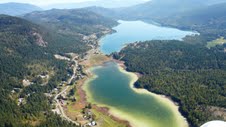Shuswap Watershed Council Perspective
- info315202
- Aug 18, 2023
- 2 min read
The White Lake Residents Association would like to share our perspective on the stresses that BC watershed management systems are currently under and how the Shuswap Watershed Council can assist this. As some are aware, White Lake is one of a handful of lakes in the province that conducts volunteer deep site testing and monitoring (level 3 MoE program) that should give us a good indication of the state of the White Lake domestic watershed. The WLRA is due to receive a summary of the lake data and samples collected the last three years. Later this fall, the BC Ministry of Environment summary report will be shared with our members and the agencies that advocate for the protection of our local water quality. White Lake has a low flow rate so contaminants that enter the water system can take well over a decade to flush. The White Lake watershed is an upper level water source that supports White Lake residents and also feeds water intakes downstream that also draw water from this watershed including the towns, cities and rural areas that depend on Shuswap watershed quality.
The SWC has funded some of our testing equipment and expenses as the WLRA participates on the SWC water quality reporting and monitoring committee. The SWC Board Members that represent the many jurisdictions and agencies participating on the Shuswap Watershed Council are tasked to advocate at a senior government level concerning watershed issues in the Shuswap area. The WLRA Water Quality Committee expects great value from this Council and depends on this established platform that needs to operate as intended.
Please consider our valuable freshwater resource as the White Lake watershed is our primary water source that needs protection at whatever cost. Under $10 a year per tax parcel is very inexpensive. The BC Provincial Ministries do not always have the complete resources and information available to provide individual watershed security to all the BC watersheds unless identified. They rely on working collaboratively with many local scientists, environmental professionals, First Nations, stewardship groups, lakeshore residents, the general public, and government agencies from most BC Communities to keep BC lakes healthy. It is currently structured that the CSRD provides funding, board leadership and input as the Regional District also has an obligation to report, advocate and protect our freshwater resources. The WLRA volunteers are depending on the effectiveness of the SWC Board Members to advocate for water and land use management corrections both local and provincial when and if there are water quality issues identified in the monitoring committee.






Comments